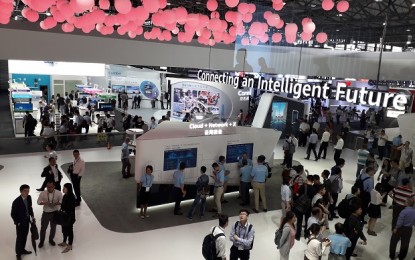
DIGITAL TRANSFORMATION. Huawei showcases its technology for digital transformation at the Mobile World Congress 2019 in Shanghai, China from June 26 to 28. Huawei Technologies Philippines, Inc. Vice President Daniel Guo said Huawei is bringing in innovative technology to help the Philippines adopt to the changes associated with digital technology application . (PNA Photo by Kris Crismundo)
SHANGHAI – Information and communications technology infrastructure and smart devices maker, Huawei, is bringing in innovative technology to the Philippines to benefit from the application of digital transformation.
Huawei Technologies Philippines, Inc. Vice President Daniel Guo said here that the company is now in partnership with the two telecommunication giants in the Philippines to rollout the 5G technology in the country.
Guo added that Huawei is also ready to partner with the new telco player, which include Chinese firm China Telecommunications Corp., for future projects in the Philippines. Huawei has been working with state-owned company in China.

“Our focus, to help the people to benefit from the digital transformation. That is why we are here. The focus currently, we are trying to help operators to improve the telecom services for the Filipino. So Filipinos can benefit from low-cost and highly efficient network experience,” he told Filipino reporters on the sidelines of the Mobile World Congress (MWC) Shanghai 2019 from June 26 to 28 here.
“We worked together with operators, design the network with low-cost, efficient solution and then implement into the government with the practical provider or contractors,” the executive added.
Guo said the 5G deployment in the Philippines will focus initially in the National Capital Region (NCR) since Metro Manila has the infrastructure to host 5G network.
“Philippines need to build the backbone for the country first, which means the fiber link to all the cities. Currently, Globe and PLDT don’t have the backbone for the country. But in China or other countries, they have that long time ago,” he said, noting that it is faster for other countries to deploy 5G network.

He stressed that this telecommunication infrastructure gap outside Metro Manila should be addressed in order for the whole country to benefit from this latest technology.
As Huawei often stressed, 5G is not just about faster network, but its application leads to digital transformation.
In his keynote speech at the MWC 2019, Huawei Deputy Chairman Ken Hu stressed the need to accelerate 5G development to maximize the benefit of the technology in different sectors to innovate and improve services to end-users.

“5G will pay a pivotal role in the digitization of all industries,” Hu said.
“At the same time, as more and more industries embrace intelligence, we will see much greater demand for technologies like cloud, AI (artificial intelligence), big data, and edge computing. With the support of 5G, these technologies will be able to support far more industrial applications than ever before – and much more efficiently, too,” he added.
He mentioned that Huawei is also active in partnering with different companies worldwide to develop 5G ecosystem.
To date, Huawei have signed 50 commercial contracts for 5G and shipped 150,000 5G base stations.

During the MWC 2019, Huawei and more than 30 industry partners established an alliance base on 5G deterministic networking.
The industry alliance aims to build 5G ecosystem and promote the 5G industry.
Moreover, Huawei obtained its 5G license in China early this month, marking the beginning of 5G commercialization in the world’s largest mobile communications market.
“Right now China is in the process of evolving towards automated, digital, and AI-driven industrial development. And 5G arrived just in time to help,” said Hu.
Hu also pointed out reasons for operators in choosing Huawei for 5G, which include its early, long-term, and heavy investments to develop 5G network.
Huawei started its 5G research in 2009, when 4G was just starting its commercial deployment.
Over the past 10 years, the Chinese firm also invested USD4 billion in 5G, and continues to invest in 5G research and development.
“When we began 5G research, there were no standards to speak of. We had to basically start from scratch – we couldn't jump into product development right away. Products are only the results you see at the tail end of a very long process,” Hu said. “This ongoing investment in R&D has helped us stay ahead.”
“But innovation isn't just about technology. Part of our success is our focus on making 5G easier to operate, more affordable, and simpler to deploy,” he added. (PNA)
